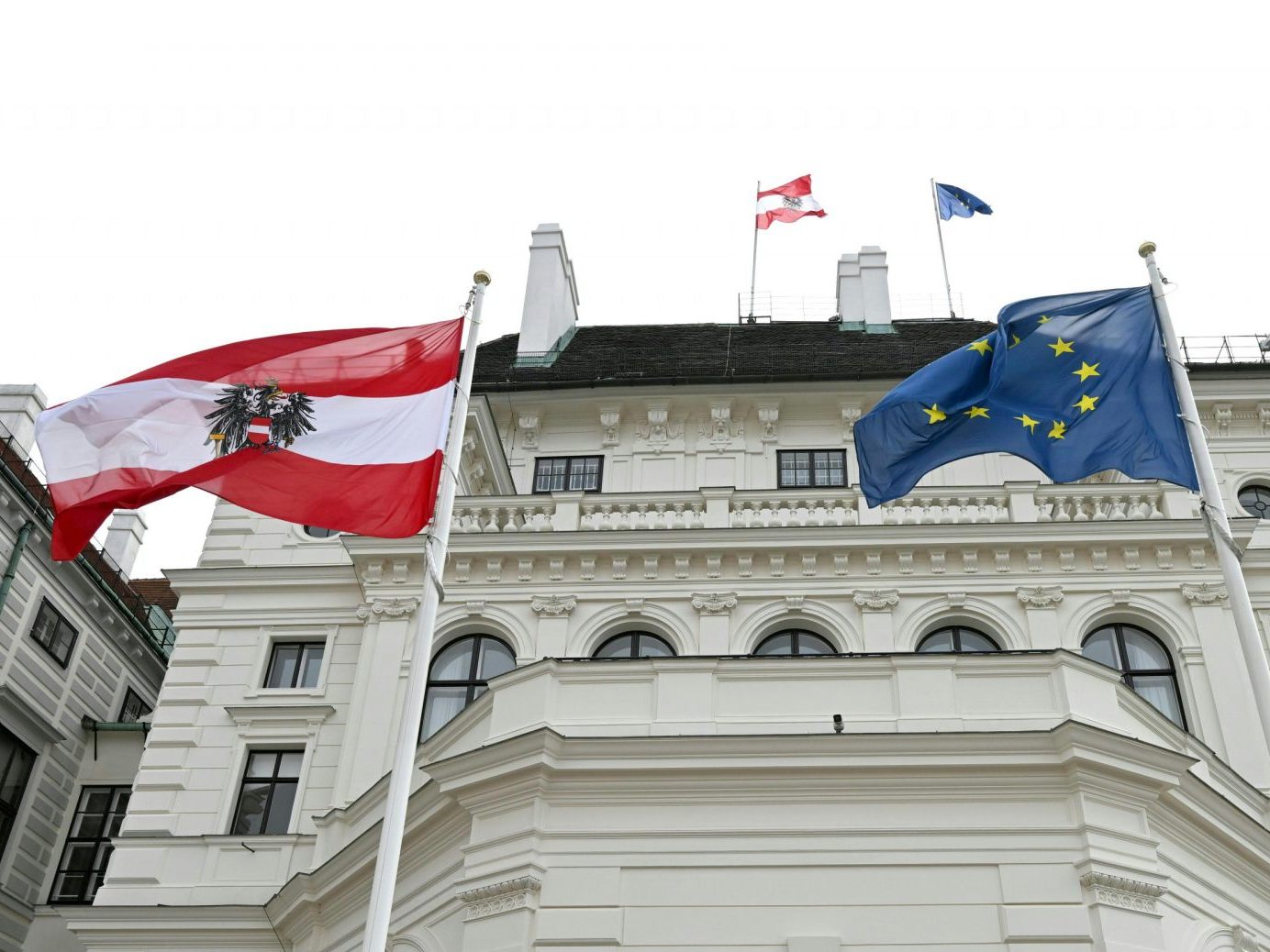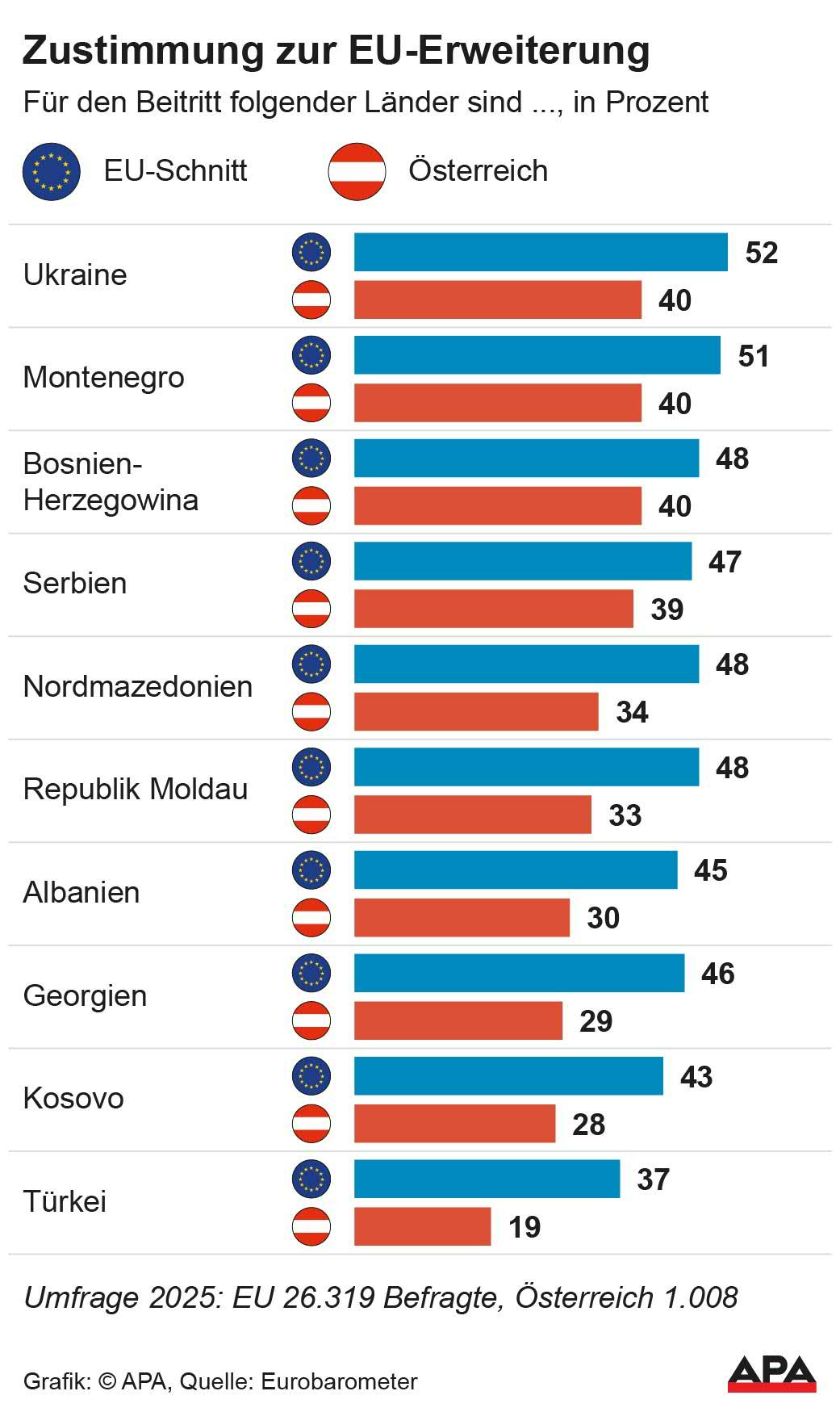Eurobarometer: Majority in Austria Against EU Enlargement

The Eurobarometer survey shows that 56 percent of citizens in the EU support an enlargement of the Union, while in Austria only 45 percent of the population are in favor.
EU Enlargement: More Skepticism Only in Czech Republic and France
More skepticism towards EU enlargement than in Austria is only found in the Czech Republic and France, where the admission of new countries is approved by only 43 percent of respondents. Among the most ardent supporters of EU enlargement, with approval rates of over 70 percent, are citizens in Sweden, Denmark, Lithuania, and Finland. The biggest concerns regarding enlargement across the EU are uncontrolled migration, corruption, organized crime, and terrorism, as well as the costs for European taxpayers.

Ukraine and Montenegro Most Popular in EU Enlargement
Looking at the candidate countries individually, none receive majority approval in Austria. The most popular here are EU memberships of Ukraine, Montenegro, and Bosnia and Herzegovina (each 40 percent), followed by Serbia (39 percent) and North Macedonia (34 percent). At the lower end are Moldova (33 percent), Albania (30 percent), Georgia (29 percent), Kosovo (28 percent), and Turkey (19 percent). On average in the EU, Ukraine (52 percent) and Montenegro (51 percent) receive the highest approval rates, with Turkey receiving the lowest (37 percent).
Plakolm Criticism of Accession Process
Minister for Europe Claudia Plakolm (ÖVP) was not surprised by the results of the survey. "The process has been dragging on for over 20 years without any concrete results becoming visible. It is completely understandable that people lose faith in it and that the advantages fade into the background," emphasized Plakolm on Tuesday in a statement to the APA. Plakolm is not attending the informal meeting of European ministers in Copenhagen due to the simultaneous government retreat. "The accession process is taking too long, and we risk the mood in the accession countries in the Western Balkans deteriorating," warned Plakolm. "People on both sides need a clear path that is implemented quickly and with tangible steps." The Minister for Europe again called for "gradual integration not only in the internal market but also in energy, infrastructure, or security," which would "advance us in the mood towards the EU and the enlargement process." Initial examples would be integration into the SEPA payment area or discussions about ending roaming charges. Plakolm: "Europe must be positively tangible in the everyday lives of people - in Austria and among the accession candidates. Only in this way can we strengthen pro-European forces - because if we do not make an effort for these countries, others will." The EU must "deliver here."
EU Enlargement: Montenegro and Albania Frontrunners
EU Enlargement Commissioner Marta Kos recently described Montenegro and Albania as the most advanced candidates, both countries could, in her view, join the EU before 2030. Montenegro aims to conclude EU accession talks by 2026 and join the Union as the 28th member state in 2028. Accession negotiations with Turkey have practically come to a standstill, in Georgia, the pro-Russian ruling party "Georgian Dream" has postponed EU accession negotiations indefinitely. Serbia must achieve normalization of its relations with Kosovo before joining the EU. Kosovo itself is not recognized by Serbia or by five EU states. The last EU enlargement round took place in 2013 with Croatia. Since then, the European Union has even become smaller with the exit of Great Britain in 2020 (Brexit).
EU Enlargement Commissioner: "Communicate Better with Citizens"
In her invitation letter for the meeting in Copenhagen, Kos stated that she wanted to hold a brief exchange on "how we can better communicate with our citizens about the enlargement." She wants to promote a "well-informed public debate, deepen citizens' understanding of the benefits of enlargement, and involve enlargement partners more closely in joint public relations work across the Union."
The head of the SPÖ-EU delegation, Andreas Schieder, described EU enlargement in a statement as "one of the strongest foreign policy instruments Europe has. Our immediate neighborhood has long become the playing field of authoritarian powers, and that is precisely why we must not continue to stand idly by as others increasingly call the shots there." Enlargement also opens up tangible opportunities for Austria. Schieder mentioned, for example, sales markets, jobs, and closer cooperation in energy and infrastructure. Parallel to enlargement, the EU needs profound internal reforms, particularly an expansion of decisions by qualified majority. "Too often we experience how blockers like Hungary paralyze the EU."
(APA/Red)
This article has been automatically translated, read the original article here.





